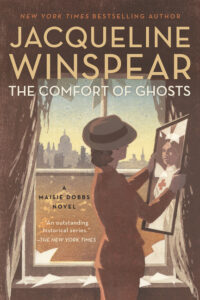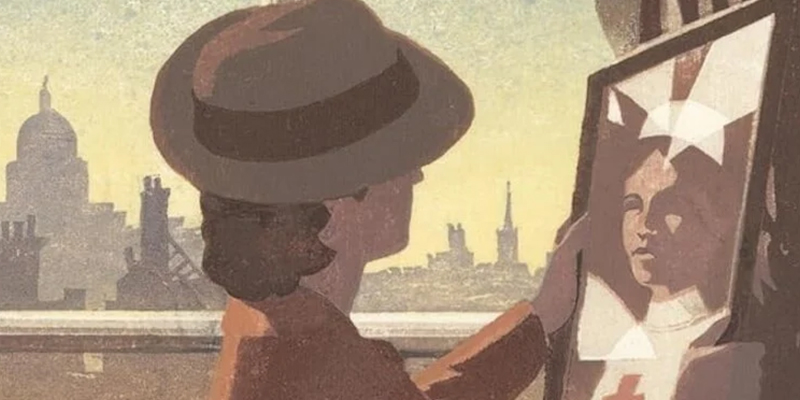Much has been written about the origin of characters in fiction, and the inspiration that presses a writer to embark upon a story—perhaps a novel or short fiction, or returning to the character time and again in a series. Sometimes characters are inspired by a writer’s past—perhaps the teacher who encouraged a love of reading, or the professor who bored everyone stiff and knocked back tots of whiskey when he thought no one was looking. There are people we pass on the street or in the media who capture our imagination. The world is full of characters for the curious writer—and of course, curiosity is an element underpinning our work, whether our chosen literary form is fiction or non-fiction, essays, journalism or fairy tales.
Writing a series with an ongoing cast means I have something of a “relationship” with each one them. One character became so strong, so forceful, I had to kill him off and only allowed him back in as a memory held by his protégé, Maisie Dobbs, the psychologist and investigator whose life I have created across eighteen novels. The moment she walked into my mind is seared into my memory. I was in my car, stuck at a red light in San Rafael, California, nothing but tail lights ahead and grey skies above. I was miles away, humming that old 1970’s song about the rain pouring in my adopted US state, when Maisie Dobbs lay claim to my imagination. She would go on to inhabit that place for over twenty years. I missed the lights changing and traffic moving, so it was only when another driver shouted, “Hey, lady—you waiting for any particular shade of green?” that I stopped listening to Miss Dobbs and hit the accelerator, the only red now blooming across my cheeks. But this woman, dressed in the garb of my grandmother’s era, seemed bound and determined to press me to tell her story.
[T]his woman, dressed in the garb of my grandmother’s era, seemed bound and determined to press me to tell her story.I thought her nagging—sometimes gentle, sometimes authoritarian—would stop, but no, she wasn’t satisfied with leaning over my shoulder, dictating as I wrote every word. She woke me up in the middle of the night, crashing into my dreams and peppering them with a cast of from her world, not mine. It was as if this character, along with others, was making it clear that at this point in my life, theirs was more important. I would get up in the early hours, bleary eyed, and I would write. Sometimes she exhausted me.
But where did she come from? In terms of her personality, I had never known anyone quite like her in my life, though in a way I had known many of her kind, so it’s no surprise that we found one another—or, if truth be told, perhaps I was searching for her. I had always admired the wise women elders of my childhood, ladies of a certain age and era who lived alone in our Weald of Kent hamlet, and whose lives had been altered forever by the Great War.
Over the years the process of getting to know Maisie Dobbs has led me to places I might otherwise never have visited. I could almost feel her at my side in France and Belgium when I walked fields where the battles of the Somme and Ypres had been fought. Together we tramped across land where the remains of men and horses had settled below the soil; at Passchendaele they had drowned in mud fifteen feet deep, it was said, and we both felt their ghosts on that windy day underneath a graphite sky. With her in my mind’s eye, I read name after name at memorials to the missing at Tyne Cot and Vimy, and as I walked along a preserved trench in Newfoundland Park, named to honor men from the island who were slaughtered in those far away trenches. A giant caribou statue overlooks the place where they fell, as if it might remind their lost spirits of home. Then we went to a tiny cemetery where a casualty clearing station was once located. It could have been the place where she had toiled as a nurse, and where her innocence was lost—the innocence that evaporates when a young person sees death of a most terrible kind. I could feel her presence as I wondered aloud, “How would I feel if that had happened to me?” And I fell to my knees, the ache so deep I could hardly find my balance again.
Sometimes those research expeditions felt almost otherworldly, as if there was something else at play in this partnership between writer and story. There was often a sense that I instinctively knew my way around in a location new to me that I was visiting to enhance my knowledge, so I could craft part of the story I was working on. It was in Munich—a city I had never visited, that I felt uneasy with my instant understanding of where to go. It had happened to me once before in my life, years earlier. The company I was working for sent me on a business trip to the Netherlands, and after our meetings one day, I went with my coworkers to a festival commemorating the liberation of Amsterdam by Canadian soldiers at the end of the Second World War. As people began to disperse, one of our group suggested going to a restaurant he had heard about, but no one knew quite how to get there, though he had the name of the street. “Oh I know the way,” I said, and without thinking, I led them to the restaurant. I put the experience out of my mind and made excuses as to how I had garnered such local knowledge. Then it happened again in Munich, when I found the correct train from Marienplatz to Dachau without consulting a person, a sign or a schedule, and despite the station being under reconstruction. While waiting for the train to return to Munich, someone asked me how to get to a certain place, and I told them which train they needed to board. Perhaps it was just luck.
One of my friends, Barbara—who I met while on a course in connection with my work; the work that came before I fell deep into writing about Maisie Dobbs—had an opinion about what might have happened to bring her into my life. Barbara told me about an old school friend who asked her if she would read the manuscript for a novel she had written. It transpired the woman had a stash of unpublished stories tucked away. Barbara agreed to dip into the pages and let her friend know what she thought. Now, here’s the interesting thing about Barbara—she is a psychic and registered medium, and not one of those people you might see at a fun fair peering into a crystal ball. Barbara works with police departments to assist in difficult cases where there is a missing person or, dare I say it, a missing body. But when she began reading the raw manuscripts, Barbara discovered something that shocked her. “I realized,” she recounted, “that in becoming a character in a novel, a spirit is experiencing a form of reincarnation—it’s another means of being alive.” It’s true what they say, ghosts really can make the hair on the back of your neck stand on end. “Okay,” I said. “That’s quite enough for me—no more about spirits.” I tried to put that image out of my mind, endeavoring to ignore the fact that a woman named Maisie Dobbs who had hitched a ride into my life on a rainy day in California, might be more than a character in a series of novels.
I have read accounts by other writers of fiction—particularly those who write a series—of the day the character entered their imagination. One writer talked about walking along a street and “seeing” this man making his way toward her. Then she realized she had imagined him, though he became the protagonist in a best-selling series. According a number of writers, dreams seem to be another place where characters show up time and again, as if pushing and pushing until they are incarnated on the page.
It was when the novel bearing the name “Maisie Dobbs” in golden cursive was sent to the printer, soon to be a book with a haunting image on the cover, that my editor shared an experience with me, as if I might provide an explanation, “You know, Jackie, it’s a funny thing, but I’ve received three different manuscripts this week, from different authors in different states, and each one seems to be about the same character.” I said something about it being an interesting coincidence, though I didn’t breathe a word about my pal Barbara, and that there might be an entrepreneurial spirit amid those pages, tripling their chances of being seen and heard.
***


















